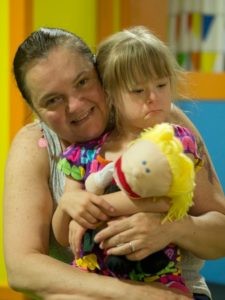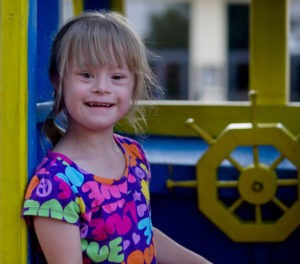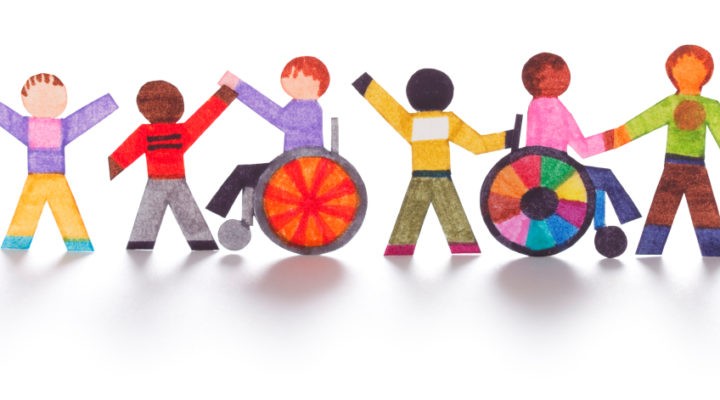For many families, the most challenging aspect of going to church on Sunday morning is getting out the door: making sure everyone is dressed, fed and in the car on time and in one piece. For families who have children with special needs, going to church is fraught with additional challenges:
- Will we be welcome and included?
- What, if any, support for my child’s needs will be available?
- Will I have to stay with my child during the service, or will qualified and trained individuals be able to care for my son or daughter so I can attend service alone?
- Will my child be invited to participate in religious activities, and in the way that meets his or her needs?
- Will other members of the congregation welcome and accept us, or look at us as “special” and “other”?
At Irving Bible Church in North Texas, those fears are quickly put to rest.

“The needs are so diverse, and the kids are unpredictable,” said Lori Baldridge, a church member who has a 16-year-old daughter with Down’s syndrome and a 10-year-old son who is typically developing. “What I’ve seen is that these kids come away feeling loved and they know they’re accepted. We know she’s in a place where she’s safe.”
And not only safe, but loved and accepted.
“This is not a pity ministry,” said Shannon Pugh, director of the special needs ministry at IBC. “We need to make sure those parents can go to church. And it’s also about empowering and including people with special needs of any kinds to use their gifts and teach others about God.”
An ever-evolving ministry
Getting to that point has taken years of hard work and intentionality, Pugh said.
When Pugh joined IBC as a congregant, the church had a respite program that offered free care for individuals with special needs so that their caretakers could have a few hours to themselves. Then, families who had children with special needs formed sort of a buddy system, she said. Volunteers looked after kids with more intensive needs in a separate room.
“There was not a really cohesive ministry,” Pugh said. “It was fragmented. The church saw a need and that the ministry was starting to grow. Kids were getting older, and it was no longer a children’s ministry but a children’s and teen ministry. In 2012, the church thought it would be better for one person to provide vision and direction.”
 Pugh, who had training as a special education teacher and who had volunteered with the program for several years, took the job.
Pugh, who had training as a special education teacher and who had volunteered with the program for several years, took the job.
Although the role was part time, “it was a big step for IBC because a lot of churches that have a special needs ministry don’t have a specific person on staff,” she noted.
Since that time, the ministry has grown — so much so that it has its own name, Arise, and its own website.
Today, Irving Bible Church includes about 25 families who wouldn’t be able to attend worship services in a regular church setting. Lucy Holden, who asked that her real name not be used to maintain her family’s privacy, is one of them. Her son, Jacob, (also not his real name) has autism.
“We adopted our son, and going into it, we knew he had special needs,” Holden said. “Our old church was super supportive throughout our adoption, but once we started going to church, it became apparent that he wasn’t able handle our church environment. The people at our old church expected him to adjust to the classroom where he was, and he just couldn’t.”
After that, Holden and her husband started alternating who would go to church each week and who would stay home with their son. Soon, though, they began to pray about finding a church that already knew how to deal with Jacob’s issues. That led them to Pugh and IBC.
‘Such a normal question’
“When I dropped him off at IBC, Shannon had someone lined up to be his buddy, and she asked, ‘What does Jacob enjoy doing?’” Holden said. “And it was such a normal question that it was such a relief to me to know why we were there.”
One major program at IBC is a respite ministry, which offers monthly activities and child care for kids with special needs and their siblings — allowing the parents to take some time for themselves to rest, recharge or take care of personal business.
“It’s easy to become isolated if you have kids with special needs.”
The respite program has been particularly helpful for Baldridge and her husband.
“A lot of times, you get the short end of the stick if you have a sibling with special needs,” Baldridge said. “IBC recognizes this and offers special activities for the siblings. It’s nice for them both to be able to go.”
And it’s nice for the parents, too.
“It gives us a break,” Baldridge said. “It’s just nice to have a dinner where we can let our guard down and have a nice conversation.”
“It’s easy to become isolated if you have kids with special needs,” she added.
Buddy program
Like many churches, IBC isn’t meeting in-person right now due to the coronavirus pandemic. Before COVID, though, the buddy program at IBC, also called “Sunshine Pals,” was a popular component of the Arise program.
“Jacob’s buddy was there every Sunday,” Holden said. “He’ll go to the appropriate class with his buddy if he’s having a good day, but if he’s having a hard time then they just do their own thing.”
One thing 5-year-old Jacob enjoys is helping the facilities manager change light bulbs throughout the building.
“And that’s a great Sunday for him if that’s what they want to do,” Holden said. “The maintenance guy gave him a set of tools for Christmas.”
Related articles:
So you think you want to start a special needs ministry?
As Americans with Disabilities Act turns 30, barriers remain
This story was made possible by gifts to the Mark Wingfield Fund for Interpretive Journalism.


